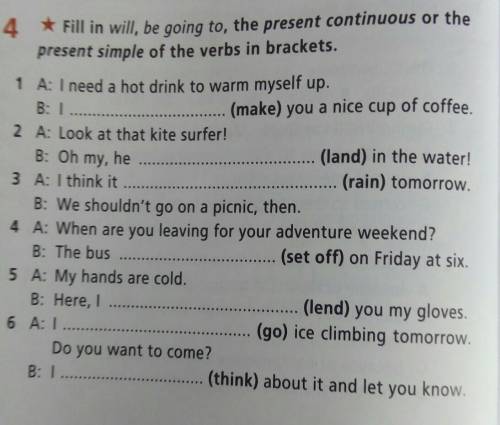Fill in will, be going to, the present continuous or the present simple of the verbs in brackets.

Другие вопросы по теме Английский язык
Популярные вопросы
- Найманы, керейты и жалайры. Урок 1 и Соотнеси государства с их правителями....
3 - Прям нужно1.Какое время описал Гоголь в произведенииисчемоно связано?2.Перечислите...
1 - Какие отрезки на данном рисунке являются гипотенузами?...
1 - 5 When was the first advert on TV and what was it for?a 1901 (a bicycle)...
2 - Заполните таблицу Три этапа Французской революции конца XVIII в. I...
2 - Найти правильное решение неравенства 9/100меньше х меньше 1...
1 - А можно понормальнее писать дибил а???...
1 - Перечислите факторы, определяющие почвенное плодородие....
2 - 3. Опираясь на характеристику трагедии как литературного жанра, найдите...
2 - Где дерево добывает пищу летом и зимой...
2
ответ:2 he is going to land
3 will rain
4sets off
5 I’m going to
6 will you go
7 will think
Объяснение:
Answer: I am going to Disneyland.
Explanation: We use "be going to" to talk about future plans and intentions. In this sentence, the speaker is talking about their plan to go to Disneyland next week.
2. Look at those dark clouds! It (rain) soon.
Answer: It is going to rain soon.
Explanation: We use "be going to" to make predictions based on present evidence. In this sentence, the speaker sees dark clouds and predicts that it is going to rain soon.
3. She (work) as a doctor when she grows up.
Answer: She will work as a doctor when she grows up.
Explanation: We use "will" to talk about future actions or decisions. In this sentence, the speaker is talking about the future career choice of the girl.
4. My parents (visit) me next month.
Answer: My parents are going to visit me next month.
Explanation: We use "be going to" to talk about future plans and arrangements. In this sentence, the speaker is talking about their parents' plan to visit them next month.
5. John usually (play) soccer on Saturdays.
Answer: John usually plays soccer on Saturdays.
Explanation: We use the present simple to talk about habits or routines. In this sentence, the speaker is describing John's regular activity of playing soccer on Saturdays.
6. Be careful! He (fall) off the ladder.
Answer: Be careful! He is going to fall off the ladder.
Explanation: We use "be going to" to make predictions based on present evidence. In this sentence, the speaker sees the person on the ladder and predicts that he is going to fall off.
7. We (have) a party tonight.
Answer: We are going to have a party tonight.
Explanation: We use "be going to" to talk about future plans and arrangements. In this sentence, the speaker is talking about their plan to have a party tonight.
8. She (not be) happy if you tell her the truth.
Answer: She will not be happy if you tell her the truth.
Explanation: We use "will" to talk about future actions or decisions. In this sentence, the speaker is suggesting that the girl will not be happy if she is told the truth.
9. Look! The sun (shine) brightly today.
Answer: Look! The sun is shining brightly today.
Explanation: We use the present continuous to describe actions happening at the moment of speaking. In this sentence, the speaker is describing the current action of the sun shining brightly.
10. Don't worry. I (help) you with your homework.
Answer: Don't worry. I will help you with your homework.
Explanation: We use "will" to talk about future actions or decisions. In this sentence, the speaker is reassuring someone that they will help them with their homework.